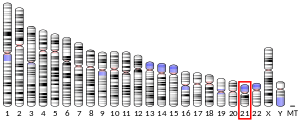RSPH1
| RSPH1 | |||||||||||||||||||||||||
|---|---|---|---|---|---|---|---|---|---|---|---|---|---|---|---|---|---|---|---|---|---|---|---|---|---|
| Identifiers | |||||||||||||||||||||||||
| Aliases | RSPH1, CILD24, RSP44, RSPH10A, TSA2, TSGA2, CT79, radial spoke head 1 homolog, radial spoke head component 1 | ||||||||||||||||||||||||
| External IDs | MGI: 1194909 HomoloGene: 11905 GeneCards: RSPH1 | ||||||||||||||||||||||||
| |||||||||||||||||||||||||
| |||||||||||||||||||||||||
| |||||||||||||||||||||||||
| Orthologs | |||||||||||||||||||||||||
| Species | Human | Mouse | |||||||||||||||||||||||
| Entrez | |||||||||||||||||||||||||
| Ensembl | |||||||||||||||||||||||||
| UniProt | |||||||||||||||||||||||||
| RefSeq (mRNA) | |||||||||||||||||||||||||
| RefSeq (protein) | |||||||||||||||||||||||||
| Location (UCSC) | Chr 21: 42.47 – 42.5 Mb | Chr 17: 31.26 – 31.28 Mb | |||||||||||||||||||||||
| PubMed search | [3] | [4] | |||||||||||||||||||||||
| Wikidata | |||||||||||||||||||||||||
| |||||||||||||||||||||||||
Radial spoke head 1 homolog (RSPH1), also known as cancer/testis antigen 79 (CT79) or testis-specific gene A2 protein (TSGA2), is a protein that in humans is encoded by the RSPH1 gene.[5]
Clinical significance
Mutations in RSPH1 are associated to Primary ciliary dyskinesia .[6]
References
- 1 2 3 GRCh38: Ensembl release 89: ENSG00000160188 - Ensembl, May 2017
- 1 2 3 GRCm38: Ensembl release 89: ENSMUSG00000024033 - Ensembl, May 2017
- ↑ "Human PubMed Reference:".
- ↑ "Mouse PubMed Reference:".
- ↑ "Entrez Gene: radial spoke head 1 homolog (Chlamydomonas)".
- ↑ Kott E, Legendre M, Copin B, Papon JF, Dastot-Le Moal F, Montantin G, Duquesnoy P, Piterboth W, Amram D, Bassinet L, Beucher J, Beydon N, Deneuville E, Houdouin V, Journel H, Just J, Nathan N, Tamalet A, Collot N, Jeanson L, Le Gouez M, Vallette B, Vojtek AM, Epaud R, Coste A, Clement A, Housset B, Louis B, Escudier E, Amselem S (September 2013). "Loss-of-function mutations in RSPH1 cause primary ciliary dyskinesia with central-complex and radial-spoke defects". Am. J. Hum. Genet. 93 (3): 561–70. doi:10.1016/j.ajhg.2013.07.013. PMC 3769924. PMID 23993197.
Further reading
- Strausberg RL, Feingold EA, Grouse LH, et al. (2002). "Generation and initial analysis of more than 15,000 full-length human and mouse cDNA sequences". Proc. Natl. Acad. Sci. U.S.A. 99 (26): 16899–903. doi:10.1073/pnas.242603899. PMC 139241. PMID 12477932.
- Shetty J, Klotz KL, Wolkowicz MJ, et al. (2007). "Radial spoke protein 44 (human meichroacidin) is an axonemal alloantigen of sperm and cilia". Gene. 396 (1): 93–107. doi:10.1016/j.gene.2007.02.031. PMC 1935023. PMID 17451891.
- Hu YH, Warnatz HJ, Vanhecke D, et al. (2006). "Cell array-based intracellular localization screening reveals novel functional features of human chromosome 21 proteins". BMC Genomics. 7: 155. doi:10.1186/1471-2164-7-155. PMC 1526728. PMID 16780588.
- Taketo MM, Araki Y, Matsunaga A, et al. (1997). "Mapping of eight testis-specific genes to mouse chromosomes". Genomics. 46 (1): 138–42. doi:10.1006/geno.1997.5014. PMID 9403069.
- Gerhard DS, Wagner L, Feingold EA, et al. (2004). "The status, quality, and expansion of the NIH full-length cDNA project: the Mammalian Gene Collection (MGC)". Genome Res. 14 (10B): 2121–7. doi:10.1101/gr.2596504. PMC 528928. PMID 15489334.
- Tsuchida J, Nishina Y, Wakabayashi N, et al. (1998). "Molecular cloning and characterization of meichroacidin (male meiotic metaphase chromosome-associated acidic protein)". Dev. Biol. 197 (1): 67–76. doi:10.1006/dbio.1998.8885. PMID 9578619.
- Ota T, Suzuki Y, Nishikawa T, et al. (2004). "Complete sequencing and characterization of 21,243 full-length human cDNAs". Nat. Genet. 36 (1): 40–5. doi:10.1038/ng1285. PMID 14702039.
This article is issued from
Wikipedia.
The text is licensed under Creative Commons - Attribution - Sharealike.
Additional terms may apply for the media files.



